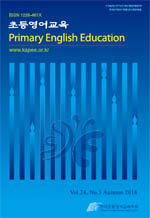The present study investigated how two Korean primary school English teachers reconstructed their professional identities in a TESOL program as their new communities of practice. In addition, it examined several critical factors which affected the participants’ professional identity reconstruction process through their participations and negotiations in each community of practice. For these purposes, with the notion of communities of practice as a theoretical framework (Lave & Wenger, 1991; Wenger, 1998), a case study using a narrative technique was conducted in a U.S.-based TESOL program. To secure triangulation, data were collected from multiple sources: observations; semi-structured interviews with participants; participants’ reflection papers; and the researcher’s field notes. Then, through grounded theory, data were analyzed critically. The findings of present study reveals the following: the participants’ professional identity construction is a transformative process in their social contexts; the participants’ reconstructed professional identities are affirmatively connected to their future teaching practices in their imagined communities of practice; and several factors, such as the participants’ teaching experiences, their old professional identities in Korea, discourses in their TESOL program and so on, significantly affected their professional identity reconstruction process. Pedagogical implications and suggestions for future studies are also discussed.
Abstract
I. Introduction
II. Theoretical Framework and Literature Review
III. Research Method
IV. Findings
V. Discussion and Pedagogical Implications
References
